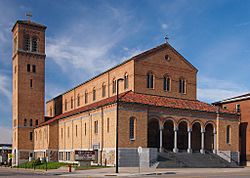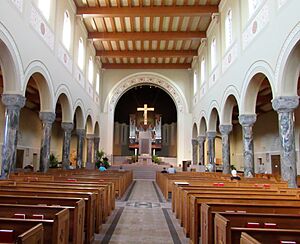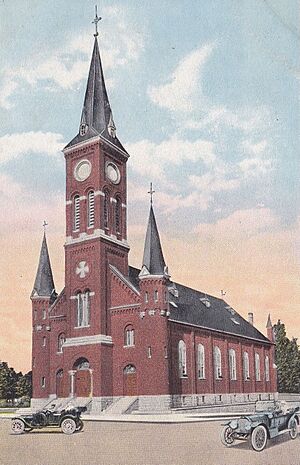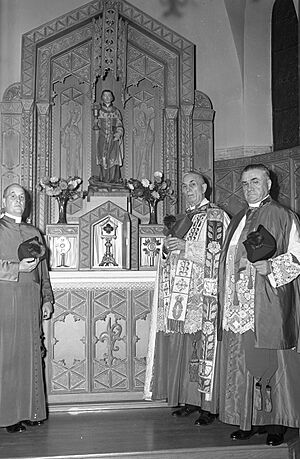Cathedral of Saint Mary (St. Cloud, Minnesota) facts for kids
Quick facts for kids Cathedral of St. Mary |
|
|---|---|
| St. Mary's Cathedral | |

The Cathedral of St. Mary from the east
|
|
| 45°33′32″N 94°09′41″W / 45.5588°N 94.1614°W | |
| Location | 25 8th Ave. S St. Cloud, Minnesota |
| Country | United States |
| Denomination | Catholic Church |
| History | |
| Founded | 1855 |
| Dedication | Blessed Virgin Mary |
| Dedicated | 1931 |
| Consecrated | 1982 |
| Architecture | |
| Architect(s) | Nairne W. Fisher |
| Architectural type | Italianate |
| Style | Italianate |
| Groundbreaking | 1922 |
| Completed | 1931 |
| Specifications | |
| Height | 75 feet (23 m) |
| Number of spires | One |
| Materials | Brick |
| Administration | |
| Diocese | Saint Cloud |
The Cathedral of St. Mary is a very important church located in St. Cloud, Minnesota, in the United States. It is the main church, called a cathedral, for the Catholic Diocese of St. Cloud. This diocese helps about 150,000 Catholic people in Central Minnesota.
Contents
A Look Back: The History of St. Mary's
Early Days of St. Mary's Church
St. Mary's Parish began in 1855. Reverend Francis Xavier Pierz held the first Mass on May 21. It took place in the home of John and Catherina Schwarz. Land was bought for $500 to build a church and a school.
In 1856, a Benedictine monk from Saint John's Abbey became the first pastor. A building that was both a church and a school was built. It was on Eighth Avenue, across from where the church offices are today.
Benedictine nuns from Pennsylvania arrived in 1857. They started the parish school. This was the first school in Stearns County. The nuns first lived in a parishioner's attic. Later, John Tenvoorde rented his "entertainment center" for them to use as a convent. Six years later, they moved to Saint Benedict's Monastery. After two years, they came back to St. Mary's. They continued to teach at the school.
A bigger, more lasting church was built in 1864. It was in the Gothic style. This church was located at Saint Germain Street and Ninth Avenue. A large rectory (a house for priests) and a new school were built in 1896.
In 1916, a four-story parish center was built. It was called Saint Mary's Institute. This building had a bowling alley and a swimming pool. It was on Eighth Avenue, across from the church.
The Gothic-style church burned down in 1920. Construction on the current church building started in 1922. When the basement was finished, Mass was held there. The rest of the church was completed in 1931.
The church's design was inspired by an old church in Italy. This was the sixth-century Basilica of Sant'Apollinare in Classe in Ravenna. The parish's pastor, Luke Fink, OSB, visited Italy. He was inspired by the buildings there. He shared his ideas with a local architect, Nairne W. Fisher. Fisher then designed the upper part of the church.
Becoming a Cathedral
Holy Angels Cathedral in St. Cloud was badly damaged by a fire in 1933. It was rebuilt without its tall spire. Because of this, Bishop Joseph Francis Busch wanted St. Mary's to become his main church. Holy Angels Cathedral is still standing today. It was updated and is now the Holy Angels Performing Arts Center. This center is used by Cathedral High School.
In 1937, Pope Pius XI officially named St. Mary's the cathedral for the St. Cloud Diocese. At that time, the Benedictine monks left St. Mary's. They moved to St. Augustine parish. Other priests, called diocesan clergy, took their place.
The rectory had become old and was torn down in 1947. The priests moved into the convent. The sisters moved to the top floor of Saint Mary's Institute. Saint Gertrude's School, which taught children with special needs, used the first floor of the Institute for a while. That building was sold and torn down in 1971.
The cathedral was greatly updated starting in 1980. This work was led by Frank Kacmarcik. A pipe organ was put in the apse (the curved part of the church) in 1984. The Mother of Perpetual Help Shrine in the lower church was destroyed by a fire. This fire also damaged the lower church and caused smoke damage upstairs.
The lower church was rebuilt. It became a chapel for daily Mass. It also has a special chapel for the Eucharist and a gathering area. Five terra cotta disks were removed from the outside of the cathedral in 2006. These disks showed a symbol called the crux gammata, or swastika. This is an ancient cross symbol. However, because it was used by the Nazi Party, the church decided it could no longer represent the Cross of Christ. New limestone disks replaced them. These new disks show the Luminous Mysteries chosen by Pope John Paul II. In 2013, the cathedral got a new floor. It also had its interior painted and its pews and kneelers fixed up.
The Shrine of Saint Cloud
Inside St. Mary's, there is a special shrine dedicated to Saint Cloud. This shrine holds several important items, called relics. These include a piece of St. Cloud's clothing and a bone fragment from Saint Cloud himself. There are also fragments from five other saints.
The statue of St. Cloud in the shrine is a copy of a 17th-century statue. This is the oldest known statue of St. Cloud. The hand holding the chalice and the chalice itself are even older. They come from the original 8th-century statue.
The statue was given to Bishop Joseph Busch in 1922. He received it when he attended a celebration in Saint-Cloud, France. This celebration marked 1,400 years since St. Cloud's birth.
Two wooden carvings are on either side of the statue. The one on the left shows St. Clothilde, who was St. Cloud's grandmother. The carving on the right shows St. Remigius, a bishop whom St. Cloud lived with when he was young. The shrine and these carvings were designed by Frank W. Jackson. He was an architect from St. Cloud.
See also
 In Spanish: Catedral de Santa María (St. Cloud) para niños
In Spanish: Catedral de Santa María (St. Cloud) para niños





